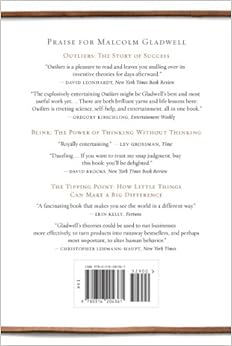30 Leadership Quotes From Malcolm Gladwell’s Book David And Goliath


This past weekend I completed Malcolm Gladwell’s latest book David And Goliath. Gladwell gives us a different perspective into how our “weaknesses” and “shortcomings” may actually be our greatest strength.
I cannot recommend this book enough. It is a masterpiece and should be on the reading list all leaders. You can order your copy by clicking here or on the image above.
To give you a glimpse into the its content, the following are 3o leadership quotes that will stretch your thinking.
- Much of what we consider valuable in our world arises out of these kinds of lopsided conflicts, because the act of facing overwhelming odds produces greatness and beauty.
- Power can come in other forms as well – in breaking rules, in substituting speed and surprise for strength.
- The very thing that gave the giant his size was also the source of his greatest weakness…The powerful and the strong are not always what they seem.
- Why do we automatically assume that someone who is smaller or poorer or less skilled is necessarily at a disadvantage?
- The whole Redwood City (girls basketball team) philosophy was based on a willingness to try harder than anyone else.
- When an underdog fought like David, he usually won. But most underdogs don’t fight like David,
- (Basketball coach Rick) Pitino has achieved extraordinary things with a fraction of the talent of his competitors.
- To play by David’s rules you have to be desperate.
- Why should he (Pitino) care what the world of basketball thought of him?…that gave him the freedom to try things no one else even dreamt of.
- 77% of Americans think that it makes more sense to use taxpayer money to lower class sizes than to raise teachers’ salaries.
- Any fool can spend money. But to earn it and save it and defer gratification – then you learn to value it differently.
- “It’s much harder than anybody believes to bring up kids in a wealthy environment…People are ruined by challenged economic times. But they’re ruined by wealth as well because they lose their ambition and they lose their pride and they lose their sense of self-worth. It’s difficult at both ends of the spectrum.
- More money stops making people happier at a family income of around seventy-five thousands dollars a year.
- Wealth contains the seeds of its own destruction.
- If you are a student – particularly a poor student – what you need is to have people around you asking the same questions…class-size reduction “steals away the peers that struggling students can learn from.”
- Small Ponds are welcoming places for those on the inside. They have all the support that comes from community and friendship.
- We form our impressions not globally, by placing ourselves in the broadest possible context, but locally – by comparing ourselves to people “in the same boat as ourselves.”
- Citizens in happy countries have higher suicide rates than citizens of unhappy countries, because they look at the smiling faces around them and the contrast is too great.
- The Big Pond takes really bright students and demoralizes them…It’s the Little Pond that maximizes your chances to do whatever you want.
- An extraordinary high number of successful entrepreneurs are dyslexic.
- “Capitalization Learning” – we get good at something by building on the strengths we are naturally given…”Compensation Learning” – what is learned out of necessity is inevitably more powerful than learning that comes easily.
- An innovator who has brilliant ideas but lacks the discipline and persistence to carry them out is merely a dreamer.
- A radical and transformative thought goes nowhere without the willingness to challenge convention.
- Learning how to deal with the possibility of failure is really good preparation for a career in the business world.
- Corpses do not run about spreading panic.
- Sixty-seven percent of the prime ministers surveyed lost a parent before the age of sixteen.
- Courage is not something that you already have…Courage is what you earn when you’ve been through the tough times and you discover they aren’t so tough after all.
- African-Americans have spent a few hundred years learning how to cope with being outgunned and overmatched.
- Fundamental to our analysis is the assumption that the population, as individuals or groups, behaves “rationally”.
- There comes a point where the best-intentioned application of power and authority begins to backfire.
No comments:
Post a Comment